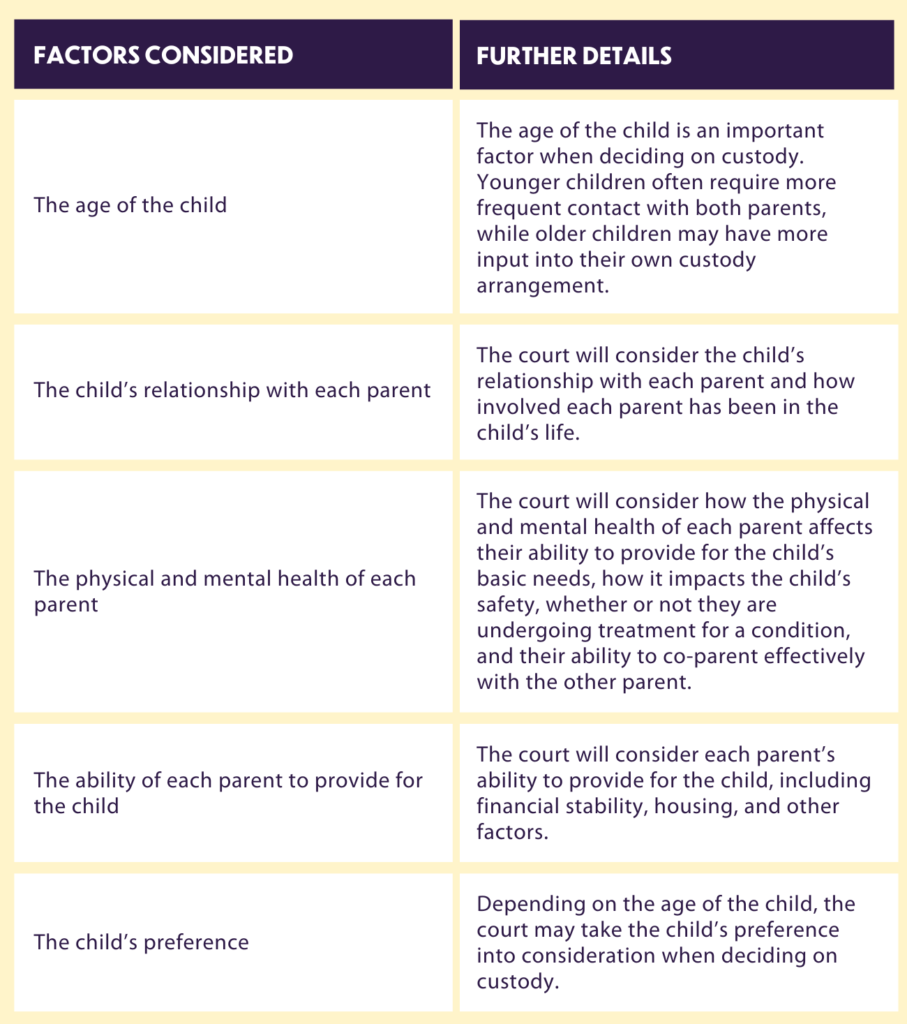Deciding on child custody and creating a co-parenting plan in the best interests of your children is one of the most emotionally charged aspects of a divorce. It can be challenging for both parents, yet it is essential for the well-being of the children.
Divorce Mediation and Child Custody
Divorce mediation offers several benefits in deciding child custody. Going this route is typically less adversarial and confrontational than going to court. This can help reduce the emotional toll on both parents and children. Mediation also allows for more creative and flexible solutions tailored to the family’s unique needs. The court typically uses a one-size-fits-all approach. Mediation is often faster and more cost-effective than going to court, which can be particularly important for families on a budget. Mediation can also help preserve the relationship between the parents. Non-combative co-parenting is extremely beneficial to children.
Child Custody and Factors Considered by the Court
If you decide to go to court regarding child custody, a judge will consider several factors before rendering a decision.

Create a Co-Parenting Plan
Once custody is determined, a parenting plan must be created that outlines the details of how the child will spend time with each parent. A parenting plan can include details such as:
- A custody schedule: This schedule outlines when the child will spend time with each parent. This can include a weekly schedule or one that alternates between parents.
- Holiday and vacation schedules: A successful parenting plan includes a schedule that outlines where the child will spend holidays and vacations, including birthdays.
- Transportation arrangements: This arrangement outlines how transportation for the child will happen between parents’ homes. A meeting spot for parenting exchanges may need to be established for parents living far apart or those with a high-conflict co-parenting relationship.
- Communication between the parents: Communication is key in a parenting plan. Include details about how parents will communicate with each other about the child. A co-parenting app like OurFamilyWizard can be a great tool for co-parent communication.
- Education and medical care: A parenting plan outlines how decisions about the child’s education and medical care will be made.
Sample Parenting Schedules
There are several different parenting schedules available as a starting point for creating your own parenting plan. Here are three sample schedules:
Every Other Weekend Schedule:
Week 1: Child spends Monday through Friday with Parent A, and the weekend with Parent B
Week 2: Child spends Monday through Friday with Parent B, and the weekend with Parent A
This schedule is simple and straightforward and provides regular contact with both parents.
2-2-5-5 Schedule:
Week 1: Child spends Monday and Tuesday with Parent A, Wednesday and Thursday with Parent B, and Friday through Sunday with Parent A.
Week 2: Child spends Monday and Tuesday with Parent B, Wednesday and Thursday with Parent A, and Friday through Sunday with Parent B.
This schedule allows for equal time with both parents and minimizes the time the child spends away from either parent.
3-4-4-3 Schedule:
Week 1: Child spends Monday through Wednesday with Parent A, and Thursday through Sunday with Parent B.
Week 2: Child spends Monday through Wednesday with Parent B, and Thursday through Sunday with Parent A.
This schedule allows for longer periods of time with each parent for the child to spend weekends with both parents.
Deciding on child custody and creating a parenting plan can be one of the most challenging and emotionally charged aspects of a divorce. Although, with careful consideration and open communication, it is possible to create a plan that meets the needs of both parents and, most importantly the best interests of the child.
Whether you choose to work with a mediator, attorney, or directly with the other parent, it is important to approach the process with a focus on collaboration and cooperation. Doing so will help ensure that your child’s emotional and physical well-being remains a top priority and that they are able to maintain strong, healthy relationships with both parents. Keep in mind that creating a parenting plan is a fluid process that may require adjustments and modifications as circumstances change, but with a solid foundation and a willingness to work together, you can build a successful co-parenting relationship that benefits everyone involved.




